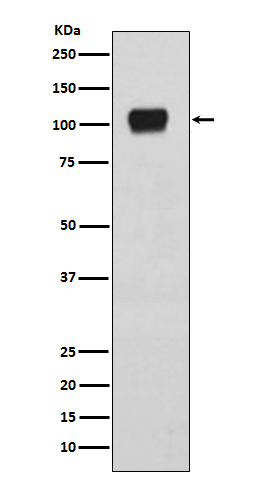ATG9A Antibody
Rabbit mAb
- SPECIFICATION
- CITATIONS
- PROTOCOLS
- BACKGROUND

Application
| WB, IHC, ICC, IP |
|---|---|
| Primary Accession | Q7Z3C6 |
| Reactivity | Rat |
| Clonality | Monoclonal |
| Other Names | ATG9A; APG9-like 1; Autophagy 9-like 1 protein; Autophagy-related protein 9A; MGD3208; MATG9; APG9 autophagy 9-like 1; APG9L1; Autophagy related 9A; |
| Isotype | Rabbit IgG |
| Host | Rabbit |
| Calculated MW | 94447 Da |
| Dilution | WB 1:1000~1:2000 IHC 1:50~1:200 ICC/IF 1:50~1:200 IP 1:50 |
|---|---|
| Purification | Affinity-chromatography |
| Immunogen | A synthesized peptide derived from human ATG9A |
| Description | Involved in autophagy and cytoplasm to vacuole transport (Cvt) vesicle formation. Plays a key role in the organization of the preautophagosomal structure/phagophore assembly site (PAS), the nucleating site for formation of the sequestering vesicle. |
| Storage Condition and Buffer | Rabbit IgG in phosphate buffered saline , pH 7.4, 150mM NaCl, 0.02% sodium azide and 50% glycerol. Store at +4°C short term. Store at -20°C long term. Avoid freeze / thaw cycle. |
| Name | ATG9A {ECO:0000303|PubMed:20124090, ECO:0000312|HGNC:HGNC:22408} |
|---|---|
| Function | Phospholipid scramblase involved in autophagy by mediating autophagosomal membrane expansion (PubMed:22456507, PubMed:27510922, PubMed:29437695, PubMed:32513819, PubMed:32610138, PubMed:33106659, PubMed:33468622, PubMed:33850023). Cycles between the preautophagosomal structure/phagophore assembly site (PAS) and the cytoplasmic vesicle pool and supplies membrane for the growing autophagosome (PubMed:16940348, PubMed:22456507, PubMed:33106659). Lipid scramblase activity plays a key role in preautophagosomal structure/phagophore assembly by distributing the phospholipids that arrive through ATG2 (ATG2A or ATG2B) from the cytoplasmic to the luminal leaflet of the bilayer, thereby driving autophagosomal membrane expansion (PubMed:33106659). Also required to supply phosphatidylinositol 4- phosphate to the autophagosome initiation site by recruiting the phosphatidylinositol 4-kinase beta (PI4KB) in a process dependent on ARFIP2, but not ARFIP1 (PubMed:30917996). In addition to autophagy, also plays a role in necrotic cell death (By similarity). |
| Cellular Location | Preautophagosomal structure membrane; Multi-pass membrane protein. Cytoplasmic vesicle, autophagosome membrane; Multi- pass membrane protein. Golgi apparatus, trans-Golgi network membrane; Multi-pass membrane protein. Late endosome membrane; Multi-pass membrane protein. Recycling endosome membrane; Multi-pass membrane protein. Endoplasmic reticulum membrane; Multi-pass membrane protein. Mitochondrion membrane; Multi-pass membrane protein. Note=Mainly localizes to the trans-Golgi network (TGN) and the endosomal system; cycles between them though vesicle trafficking (PubMed:27316455, PubMed:27663665). Export from the TGN to promote formation of autophagosomes is mediated by the AP-4 complex (PubMed:29180427, PubMed:30262884). Under amino acid starvation or rapamycin treatment, redistributes to preautophagosomal structure/phagophore assembly site (PAS) (PubMed:16940348). The starvation-induced redistribution depends on ULK1, ATG13, as well as SH3GLB1 (PubMed:16940348). Upon autophagy induction, a small portion transiently localizes to the autophagic membranes (PubMed:22456507) Recruited to damaged mitochondria during mitophagy in a RIMOC1- dependent manner (PubMed:34432599). |

Thousands of laboratories across the world have published research that depended on the performance of antibodies from Abcepta to advance their research. Check out links to articles that cite our products in major peer-reviewed journals, organized by research category.
info@abcepta.com, and receive a free "I Love Antibodies" mug.
Provided below are standard protocols that you may find useful for product applications.
If you have used an Abcepta product and would like to share how it has performed, please click on the "Submit Review" button and provide the requested information. Our staff will examine and post your review and contact you if needed.
If you have any additional inquiries please email technical services at tech@abcepta.com.













 Foundational characteristics of cancer include proliferation, angiogenesis, migration, evasion of apoptosis, and cellular immortality. Find key markers for these cellular processes and antibodies to detect them.
Foundational characteristics of cancer include proliferation, angiogenesis, migration, evasion of apoptosis, and cellular immortality. Find key markers for these cellular processes and antibodies to detect them. The SUMOplot™ Analysis Program predicts and scores sumoylation sites in your protein. SUMOylation is a post-translational modification involved in various cellular processes, such as nuclear-cytosolic transport, transcriptional regulation, apoptosis, protein stability, response to stress, and progression through the cell cycle.
The SUMOplot™ Analysis Program predicts and scores sumoylation sites in your protein. SUMOylation is a post-translational modification involved in various cellular processes, such as nuclear-cytosolic transport, transcriptional regulation, apoptosis, protein stability, response to stress, and progression through the cell cycle. The Autophagy Receptor Motif Plotter predicts and scores autophagy receptor binding sites in your protein. Identifying proteins connected to this pathway is critical to understanding the role of autophagy in physiological as well as pathological processes such as development, differentiation, neurodegenerative diseases, stress, infection, and cancer.
The Autophagy Receptor Motif Plotter predicts and scores autophagy receptor binding sites in your protein. Identifying proteins connected to this pathway is critical to understanding the role of autophagy in physiological as well as pathological processes such as development, differentiation, neurodegenerative diseases, stress, infection, and cancer.


